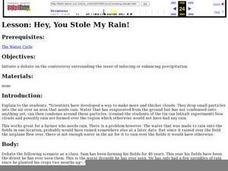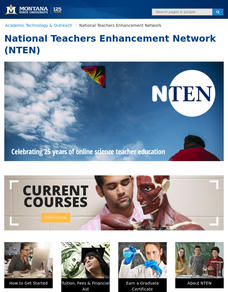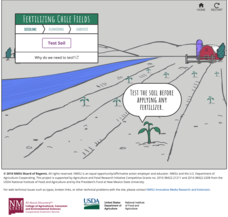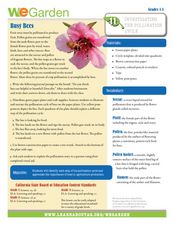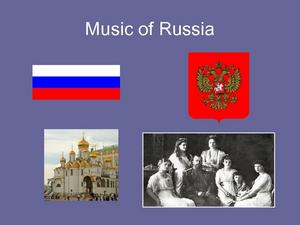Curated OER
Hey, You Stole My Rain!
Pupils review various scenarios in regards to the water cycle to determine what the best solution is to the problem. Students write their opinions on the controversies.
Curated OER
Demonstrating Erosion in Action
Students easure and record volume of water, then measure and record mass of soil. They explain the effects of the following in controlling erosion: Contouring, cover crop, strip cropping, reforestation, inter-seeding.
Curated OER
The "Coal LIfecycle" Scrapbook
Students discover how coal is formed. In this science lesson, students create a scrapbook on the life cycle of coal and show how coal is formed by showing pictures of each stage.
Curated OER
Lifecycle of Painted Lady Butterflies
Students make a chart of the life cycle of the painted lady butterflies that the class observes over a period of several days.
Houghton Mifflin Harcourt
American Stories: Challenge Activities (Theme 2)
For those class members who have mastered the basic concepts and need extra challenges, here's a packet of activities sure to engage them in stories about American immigration and exploration. Kids may design a dramatic presentation...
Chicago Botanic Garden
Introducing Ecosystem Services
Purifying air and water, providing soil in which to grow crops, and moving water through its natural cycle are all services an ecosystem provides that benefit humans. Lesson four in a series lets learners explore and discuss the value of...
Curated OER
How Do We Know These Beetles Are Safe to Use?
Students evaluate the impact beetles have on plants. In groups, they select plants to expose to leaf-feeding beetles and place those beetles on the caged plants. They observe the beetles and discuss the insect and plant interaction...
Curated OER
Horticulture Crops in the agro-ecosystem
Ninth graders apply ecological analysis to fruit and vegetable production systems. In this horticulture lesson students learn about different management practices.
Learning Games Lab
Fertilizing Chile
Fertilizer can mean the difference between a profit and a loss. Scholars use an online interactive to explore the effects of fertilizing in agriculture. Given information about the nitrogen levels in the soil, they decide the fertilizer...
Curated OER
Busy Bees
Students explore the pollination cycle. In this pollination lesson, students investigate the process of pollination. Students illustrate the pollination cycle of bees on paper plates.
Curated OER
Those Busy, Buzz'n Worker Bees
Students research information on worker bees. In this insect lesson, students review the body parts of insects and how bees find flowers. They discuss compound and simple eyes and the life cycle of a worker bee.
Curated OER
Terrariums: A Look at the Living and Nonliving World
Third graders examine life in a terrarium and relate it to life in a larger environment. In this terrarium instructional activity, 3rd graders examine how living and non-living things work together by examining the changes in a...
Curated OER
Is it Partly Cloudy or Partly Sunny?
Students investigate the concept of weather and how it is created. They review relevant vocabulary related to weather. Students predict weather given slight background knowledge. The lesson includes background information for the...
Curated OER
The Greatest Show on Earth: The World's Smallest Animals
Students create instruments to capture different types of insects. In this The Greatest Show on Earth: The World's Smallest Animals lesson, students compare the attributes of certain insects and record the data on a chart. After catching...
Curated OER
The Rock Cycle
Third graders, in groups, examine soil samples with magnifying glasses. They discuss the living and non-living things they find in their soild samples.
Curated OER
Strawberry Girl: Outdoors in Florida
Young scholars explore nature by researching the state of Florida. In this animal identification lesson, students read a children' story and research the Internet to discover the difference in animal life between the early 1900's and...
Curated OER
The Invasion of the Medfly
Students examine the invasion of the fruit fly in California. In groups, they observe and record the fruit fly's lifecycle and how they affect humans in society. They also discuss the history and geography of the fly and the different...
Curated OER
Clip the Face
Students discover the moon's phases and the rarity of eclipses. In this lunar lesson, students view a video titled Spin Around the Solar System: A Moon Dance, which demonstrates the key differences between a lunar and solar eclipse....
Curated OER
Pesticide Watch Card
Young scholars examine human health by identifying dangerous pesticides. In this agriculture lesson, students research the food production system in the United States and discuss dangers such as pesticides, chemicals and insecticides...
Curated OER
Two Beets Or Not Two Beets—What Is Your Question?
Students use the scientific method to test an idea regarding the structures of a plant as it supports the biological evidence for life. In this growing roots lesson plan, students use organizing sheets to record their findings. Students...
Curated OER
The Amazing Ant
Students explain that ants are an important element of nature's balance. Ants eat many insects and are food to other animals. They watch a video and conduct hands-on activities that give them an excellent overview of the ants role in...
Curated OER
The Black Death: 1347 - 1351
Grim and gruesome, the Black Death literally infects history with its social and political ramification. Your class will be positively agog over the details of the Plague, from its causes to its symptoms, and eventually to its grisly end...
Curated OER
Music of Russia
Music around the globe may sound different, but it always tends to function partly as a mode of communicating religion, rights of passage, and oral tradition. Delve into the world of Russian music. Folk, peasant, Cossack, and orchestral...
EnLiST
Trap Your Own Insects: What’s in Your Backyard?
Young entomologists construct three types of insect traps—pitfall, pollinator, and panel—before setting their traps out and observing what they caught. They then observe what types of insects the different traps attract.


